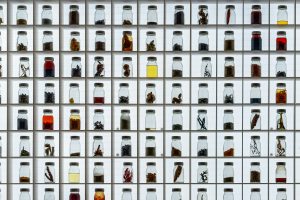
The food science and food industry job market is evolving rapidly as breakthroughs in technology, health, and sustainability reshape what it means to have a PhD in the field. This week we screened a wide range of jobs (posted over at SmartJobs) with a focus on the food industry from a variety of specialist areas.
What are the trends shaping food science careers?
This isn’t your grandfather’s food science. In 2025 you can come at this growing industry from a variety of areas, for example:
– Alternative Proteins & Carbon Utilization: Companies are investing heavily in sustainable proteins—from plant-based meats to carbon-to-protein technologies that turn CO₂ into valuable food ingredients.
– Precision Fermentation & Biotech: Next-gen biotech methods (e.g., fermentation, cultivated meat) are driving demand for scientists well-versed in microbial engineering and production systems.
– Artificial Intelligence & Data Skills: AI in ingredient design, supply chain optimization, and analytics is booming. PhDs skilled in Python, statistical modeling, and bioinformatics are highly sought after.
– Health & Nutrition Focus: Development of products for gut health, GLP-1 users, and personalized nutrition. R&D labs actively seek scientists knowledgeable in nutraceuticals and functional foods.
– Sustainability & Waste Reduction: Roles focusing on up-cycled ingredients, waste-free processes, and regulatory compliance for sustainable production are growing.
What are the recent job market statistics?
– U.S. job growth for food scientists and technologists is projected at 7–8% from 2023 to 2033—faster than the average for all occupations (source: BLS)
– There are over 16,500 jobs for food scientists in the U.S., expected to grow to more than 17,700 by 2030.
– California, New Jersey, and Texas lead in concentration of food science jobs; the sector thrives in urban centers and near major food manufacturers.
– The average salary for food scientists: $74,340 in 2025, with experienced product developers earning well over $100,000.
– More than 90,000 active food scientist job openings exist nationwide in 2025, indicating robust demand.
What are the in-demand roles for PhDs?
A doctorate opens doors in multiple sectors, and employers value scientific depth paired with business or regulatory savvy.
| Role | Sector(s) | Description |
|---|---|---|
| R&D Scientist | Industry, Startups | Designing innovative ingredients, improving flavors, developing sustainable foods |
| Product Developer | Food Companies | Creating new products (e.g., alternative proteins, functional foods) |
| Regulatory Affairs Officer | Corporations, Government, NGOs | Ensuring product compliance with food laws and safety standards |
| Toxicologist | Academia, Industry | Researching safety/toxicity of food components and additives |
| Sensory Scientist | Consumer Research, Food Brands | Testing and analyzing consumer food experiences |
| Nutritional Therapist | Healthcare, Corporate Wellness | Designing personalized nutrition protocols; advising on functional ingredients |
| Data Analyst | Tech-Enabled Food Startups | Using big data, ML, AI to optimize processes, predict trends, and design recipes |
Tips for PhDs Making the Leap
– Network Actively: Join professional organizations (e.g., Institute of Food Technologists) and attend sector conferences to meet employers and peers.
– Build Hybrid Skills: Develop proficiency in business strategy, regulatory knowledge, or computational tools—these can be as critical as lab skills.
– Stay Informed: The sector shifts quickly—stay up to date on AI, sustainability practices, and new health trends to remain employable and competitive.
– Get Practical Experience: Pursue internships, consultancies, or short industry stints, especially if transitioning from academia.
The demand for food PhDs is fueled by the need to solve challenges in nutrition, health, and climate resilience. By leveraging your advanced scientific training—and staying agile in business, tech, and regulation—you’ll be well-positioned for a rewarding career in the food industry now, and into the future.
***
Are you affiliated with a subscribing university? If not, we now offer individual subscriptions.
Go HERE to learn more!
***
Photo by Poul Hoang on Unsplash

